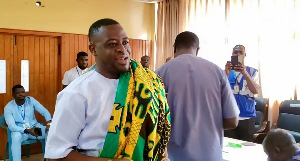Yendi (NR), June 3, (Credit Dawuni 96 Stringer) GNA - The management= of waste and environmental sanitation is a major challenge facing communities in Yendi Municipality, the Chief Executive of area, Mr Zakaria Issah has said. He told the Unit Committee members to place premium on sanitation and waste management activities by carrying out education and communal labour to rid their communities of filth and health hazards. Mr Zakaria said this at the swearing-in of Unit Committee members at separate ceremonies in the Yendi Municipality of Northern Region. He indicated that there was no doubt that the Unit Committee members were assuming office at a time that their communities had virtually relegated to the background, the need for collective action at the community level towards dealing with the myriad of development challenges.
Mr Zakaria noted that the need for Unit Committees to work in tandem with their chiefs and traditional authorities could not be over-emphasized. He said the unit Committees have not been established to take over th= e mandate of their chiefs, rather for them to harness the potentials in their chiefs and assist them to carry out activities that would positively transform the lives of their people. According to the Municipal Chief Executive, it was also important to mention that as they settle down to work as Unit Committee members, they must come out with innovative strategies to help the Assembly to generate enough revenue for development. He said the National Democratic Congress (NDC) Government recognized that without the effective involvement of the people at the local governance level, sustainable peace and development would continue to elude them. He announced that it was in that vein that immediately after assuming office the government moved into swift gear in reviewing legal aspects of local government arrangement in the country to really make the people take their destiny int= o their own hands.
Mr Zakaria stated that the passage of the local Government (Urban, Zonal and Town Councils and Unit-Committee Instrument (LI 1967) of 2010, has reduced the number of electoral areas in each the District.
He said the membership had also been abolished and all the five members were to be elected as they had in each district. He said the membership had been reduced to five from the original unwieldy figure of 15 members, and Government appointees on the Unit Committees had also been abolished and all the five members were to be elected as they had in the district level elections recently.
Regional News of Friday, 3 June 2011
Source: GNA












